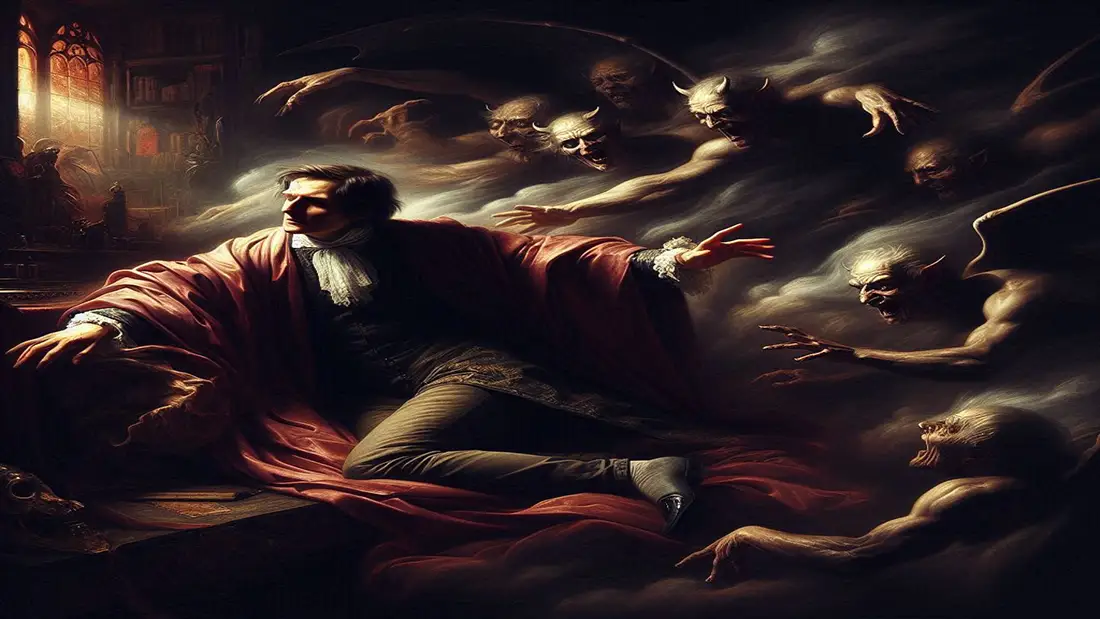“Doctor Faustus” by Christopher Marlowe is a tragic play that follows the journey of Dr. Faustus, a man who, dissatisfied with traditional forms of knowledge and power, turns to necromancy and makes a pact with the devil. The play is divided into several acts, and Act 5 marks the tragic culmination of Faustus’ choices. This act brings the audience face to face with the consequences of his decision to sell his soul for worldly power and knowledge. In this composition, we will summarize the key events in Doctor Faustus-Act 5 and explore its thematic significance.
Read More: Doctor Faustus-Act 4 Summary
Doctor Faustus-Act 5 Summary

As Doctor Faustus-Act 5 begins, Faustus is nearing the end of the 24 years for which he sold his soul to Lucifer. These years have been filled with indulgence in magical powers, but they have also been accompanied by a growing sense of dread and despair. Faustus’ inner turmoil is evident in this final act, as he contemplates the irreversible nature of his pact. Despite his earlier defiance, Faustus now seeks redemption but realizes it is too late.
In this act, Faustus’ inner conflict becomes apparent. He has come to understand the gravity of his actions, yet he is too far gone to seek forgiveness. There is an overwhelming sense of regret, but it is overshadowed by the realization that redemption is impossible. In Doctor Faustus-Act 5, Marlowe skillfully explores the theme of despair and the inability to escape the consequences of one’s actions. Faustus’ fall is not just a physical one but a moral and spiritual collapse that leads him toward eternal damnation.
The final scene of Doctor Faustus-Act 5 shows Faustus attempting to repent, but the devils are unrelenting. Throughout the play, we have seen Faustus’ various attempts to break free from the pact or seek a way out, but in Act 5, there is no turning back. Faustus cries out for mercy, but his cries are unanswered. The devils come to claim his soul, and he is dragged to hell. The tragic nature of Faustus’ end is highlighted by the fact that he could have been saved if he had truly repented earlier, yet he delayed until it was too late.
The scene where Faustus is taken by the devils is one of the most powerful moments in Doctor Faustus-Act 5. It shows the culmination of his inner struggle, the struggle between his intellectual pride and the deeper realization of his spiritual destruction. In his final moments, Faustus tries to make a last-minute plea for mercy, but the devils mock him. This mocking underscores the futility of his earlier choices and serves as a grim reminder of the consequences of hubris.
In addition to Faustus’ fate, Doctor Faustus-Act 5 also reveals the responses of those around him. The scholars who once revered Faustus as a great mind are now saddened and regretful. They express their grief, but there is little they can do to prevent the inevitable. Their helplessness is a reflection of the larger theme of fate and the inability to escape one’s destiny, a theme that pervades the entire play.
Marlowe uses Doctor Faustus-Act 5 to critique the Renaissance obsession with humanism and the pursuit of knowledge at any cost. Faustus, who once believed that knowledge and power could bring him happiness, ends up in misery. His tragic downfall serves as a warning against the dangers of excessive ambition and the refusal to accept the limitations of human nature. The play suggests that the pursuit of knowledge without ethical considerations leads to ruin and despair.
The final moments of Doctor Faustus-Act 5 are marked by a stark contrast between Faustus’ initial arrogance and his final submission to the devils. Throughout the play, Faustus has been portrayed as a man who is proud of his intellectual abilities and who believes that he can control the forces of the universe. However, in the end, he finds himself powerless and at the mercy of the very forces he sought to dominate. This reversal of power highlights the central tragedy of the play: Faustus’ inability to reconcile his thirst for knowledge with the moral and spiritual consequences of his actions.
One of the most tragic aspects of Doctor Faustus-Act 5 is that Faustus never truly comes to terms with his own guilt. He never truly repents, even in his final moments. His desire for redemption is overshadowed by his fear of the inevitable. This is a poignant commentary on the nature of guilt and redemption in the play. Faustus’ inability to repent fully reflects the idea that some actions are so irreversible that they leave a permanent mark on the soul, one that cannot be undone by a mere plea for forgiveness.
As Doctor Faustus-Act 5 concludes, the chorus delivers a final reflection on the events of the play. They remind the audience of the dangers of ambition and pride and offer a moral lesson about the consequences of making a pact with the devil. The play ends with a reminder that all of Faustus’ great achievements and knowledge could not save him from the fate he chose. His story is a tragic cautionary tale about the limits of human power and the importance of humility and repentance.
Read More: Doctor Faustus-Act 3 Summary
In conclusion, Doctor Faustus-Act 5 serves as the tragic culmination of the themes and conflicts explored throughout the play. Faustus’ desperate attempts to repent, his ultimate damnation, and the responses of those around him create a somber and reflective ending. Marlowe’s portrayal of Faustus’ downfall is a powerful reminder of the dangers of unchecked ambition, intellectual arrogance, and the failure to recognize the consequences of one’s actions. The play, particularly in its final act, urges the audience to reflect on the value of humility, the dangers of overreaching, and the importance of moral integrity in the pursuit of knowledge.



